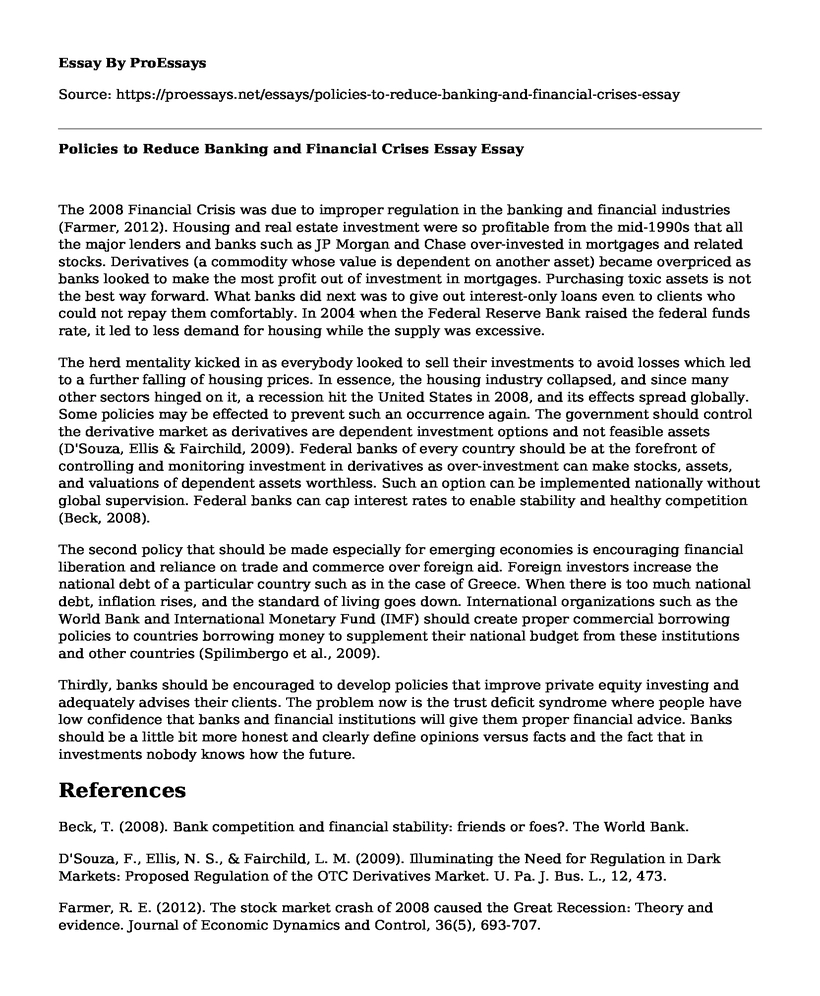The 2008 Financial Crisis was due to improper regulation in the banking and financial industries (Farmer, 2012). Housing and real estate investment were so profitable from the mid-1990s that all the major lenders and banks such as JP Morgan and Chase over-invested in mortgages and related stocks. Derivatives (a commodity whose value is dependent on another asset) became overpriced as banks looked to make the most profit out of investment in mortgages. Purchasing toxic assets is not the best way forward. What banks did next was to give out interest-only loans even to clients who could not repay them comfortably. In 2004 when the Federal Reserve Bank raised the federal funds rate, it led to less demand for housing while the supply was excessive.
The herd mentality kicked in as everybody looked to sell their investments to avoid losses which led to a further falling of housing prices. In essence, the housing industry collapsed, and since many other sectors hinged on it, a recession hit the United States in 2008, and its effects spread globally. Some policies may be effected to prevent such an occurrence again. The government should control the derivative market as derivatives are dependent investment options and not feasible assets (D'Souza, Ellis & Fairchild, 2009). Federal banks of every country should be at the forefront of controlling and monitoring investment in derivatives as over-investment can make stocks, assets, and valuations of dependent assets worthless. Such an option can be implemented nationally without global supervision. Federal banks can cap interest rates to enable stability and healthy competition (Beck, 2008).
The second policy that should be made especially for emerging economies is encouraging financial liberation and reliance on trade and commerce over foreign aid. Foreign investors increase the national debt of a particular country such as in the case of Greece. When there is too much national debt, inflation rises, and the standard of living goes down. International organizations such as the World Bank and International Monetary Fund (IMF) should create proper commercial borrowing policies to countries borrowing money to supplement their national budget from these institutions and other countries (Spilimbergo et al., 2009).
Thirdly, banks should be encouraged to develop policies that improve private equity investing and adequately advises their clients. The problem now is the trust deficit syndrome where people have low confidence that banks and financial institutions will give them proper financial advice. Banks should be a little bit more honest and clearly define opinions versus facts and the fact that in investments nobody knows how the future.
References
Beck, T. (2008). Bank competition and financial stability: friends or foes?. The World Bank.
D'Souza, F., Ellis, N. S., & Fairchild, L. M. (2009). Illuminating the Need for Regulation in Dark Markets: Proposed Regulation of the OTC Derivatives Market. U. Pa. J. Bus. L., 12, 473.
Farmer, R. E. (2012). The stock market crash of 2008 caused the Great Recession: Theory and evidence. Journal of Economic Dynamics and Control, 36(5), 693-707.
Spilimbergo, M. A., Symansky, M. S. A., Cottarelli, M. C., & Blanchard, O. J. (2009). Fiscal policy for the crisis. International Monetary Fund.
Cite this page
Policies to Reduce Banking and Financial Crises Essay. (2022, Jul 08). Retrieved from https://proessays.net/essays/policies-to-reduce-banking-and-financial-crises-essay
If you are the original author of this essay and no longer wish to have it published on the ProEssays website, please click below to request its removal:
- A Good Constitution Elements
- Race and Multiculturalism in Singapore Essay
- Control in Combating Financial Corruption in Government Agencies: A Saudi Arabian Case Study
- Essay Sample on Globalization: Benefits, Impacts and Challenges
- Georgia's Transportation: Challenges and Strategies for Growth - Essay Sample
- Maximizing Employee Performance: Motivation, Behaviors, and Attitudes - Research Proposal
- Essay Example on Pollution Crisis: Transportation Sector a Major Global Source







